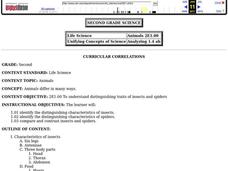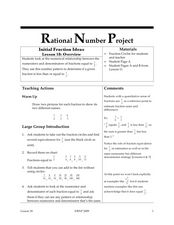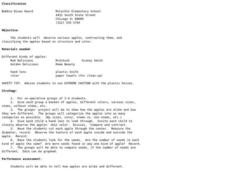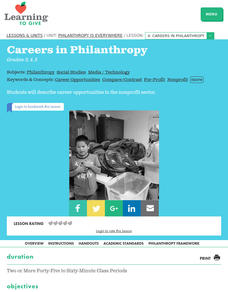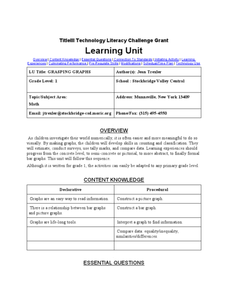Curated OER
Animals
Second graders explore the ways in which animals differ. They discuss the characteristics of insects and spiders. Students identify the characteristics of insects and spiders. They compare and contrast insects and spiders.
Curated OER
Introducing Models to Elementary School Students
Students explore the concept of creating models. For this model representation lesson, students are introduced to the idea of a model and discuss the differences between models and the actual object.
Curated OER
Tools of the Trade
Students create and then play a game similar to Memory, which encourages them to recall what they have learned about different occupations and the related tools.
Curated OER
On the Wright Brothers' Flight Path
In this airplane worksheet, learners complete a graphic organizer by comparing three Wright brothers' airplanes: how were they alike and how were they different.
Science Matters
Landforms from Volcanoes
Three major types of volcanoes exist: cinder cone, composite/strata, and shield. The 18th lesson in a 20-part series covers the various landforms created from volcanoes. Scholars work in pairs to correctly identify the three...
Curated OER
Using the Web to Explore Shapes
Third graders research the Internet to locate geometric designs in familiar buildings. They review shapes, solids, angles and symmetry as they research websites of familiar buildings in Louisville. They record the information they see...
Curated OER
Matter, Matter, Everywhere!
Eighth graders make inquiry about the existence of matter. A definition of the word is needed before students can engage in various activities. The application of knowing about matter is done in the working of experiments.
Curated OER
Shapes in Our World
Help your students explore shapes. They classify shapes and identify them in their everyday world. Plane shapes are explored, and they classify and identify the plane shapes.
Curated OER
Initial Fraction Ideas Lesson 15: Overview
Observe fraction numerators and denominators to determine if they are less than or equal to 1/2. In this fractions lesson plan, students simplify fractions and determine their relationship to 1/2.
Curated OER
Gone But Not Forgotten
Third graders examine animals and organisms that have become extinct and their similarities to living organisms. In this extinction instructional activity students divide into groups and research extinct animals.
Curated OER
Careers in Philanthropy
Students compare businesses that are nonprofit and for profit. In this philanthropy lesson, students sort photographs of local businesses into profit and nonprofit businesses. Students construct a Venn diagram to compare and contrast the...
Curated OER
All about Greece
In this Greece worksheet, students learn and report about Greece. Activities include geography, natural resources, recipes, landmarks, history and climate. Students do their own research.
Curated OER
Ender's Game: Ender's Shadow Projects
Most likely intended for a secondary remedial class. This lesson engages students in literary analysis through a creative project. They choose one project focused on taking the protagonist through a hero's journey. This link...
Mathalicious
Pic Me!
Finally! Math and Instagram have come together to discuss the correlation between likes and followers. High schoolers can't help but want to discover what makes one account more popular than another by developing a line of best fit and...
Rational Number Project
Initial Fraction Ideas Lesson 9 Overview
Visual models support young mathematicians with exploring equivalent fractions. Starting with a quick warm-up problem, children go on to work through a series of guiding practice problems before working with a partner identifying and...
Curated OER
Initial Fraction Ideas Lesson 13: Overview
Here is a good fractions lesson which invites learners to fold paper strips to represent an equivalent fraction to the fraction model using chips or tiles displayed on the overhead. They arrange chips to represent a given fraction.
EngageNY
The Opposite of a Number
It's opposite day! The fourth installment of a 21-part module teaches scholars about opposites of integers and of zero. Number lines and real-world situations provide an entry point to this topic.
Curated OER
Classification
Students explore classification. In this science lesson plan, students observe various apples, contrasting them, and classifying the apples based on structure and color.
Curated OER
The Cleverest Thief
Third graders read the story The Cleverest Thief and complete language art activities to go along with it. Students complete activities including discussion, reading, writing, predicting, drawing, role playing, and sequencing.
Curated OER
Philanthropy is Everywhere Lesson 4: Careers in Philanthropy
Students discover career opportunities in the non-profit sector. They look at local business to determine compare and contrast for profit and non-profit businesses. They participate in a non-profit job fair.
Curated OER
Technology Literacy Challenge Grant Learning Unit
First graders explore counting and classification. They sort leaves, create graphs, write sentences for the data in the graphs, develop graphs for shapes, favorite animals, birthdays, and participate in a die prediction game.
Curated OER
Building Bridges for Young Learners - Self
Students explore self analysis by investigating other cultures. In this personal characteristics lesson, students utilize the Internet to read about a child from Niger, and many other students around the globe. Students compare their own...
Southern Nevada Regional Professional Development Program
Focus: Spelling Common Words
If you’re going to get a tattoo, make sure your artist writes it right because it’s hard to correct their inkings. That’s the big idea in this short lesson plan on commonly misspelled words like their/there/they’re and it’s/its. ...
Curated OER
I Am Special and You Are Special Too #5
The student create a drawing of themselves through the use of multicultural people color crayons. They explain to a teacher what makes them special. Students investigate family types, skin color, eye color, hair color, and favorites.


